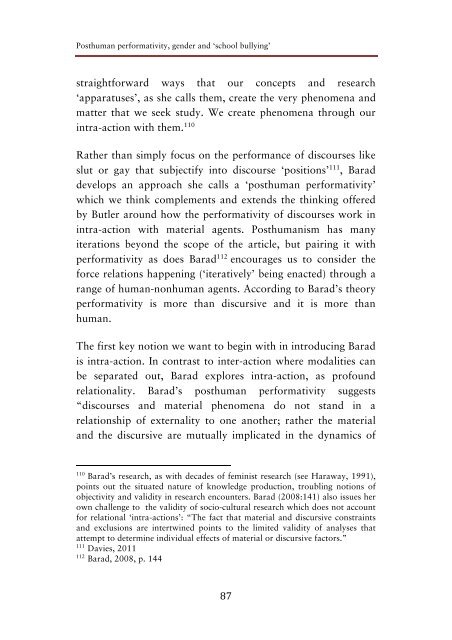You also want an ePaper? Increase the reach of your titles
YUMPU automatically turns print PDFs into web optimized ePapers that Google loves.
Posthuman performativity, gender and ‘school bullying’<br />
straightforward ways that our concepts and research<br />
‘apparatuses’, as she calls them, create the very phenomena and<br />
matter that we seek study. We create phenomena through our<br />
intra-action with them. 110<br />
Rather than simply focus on the performance of discourses like<br />
slut or gay that subjectify into discourse ‘positions’ 111 , Barad<br />
develops an approach she calls a ‘posthuman performativity’<br />
which we think complements and extends the thinking offered<br />
by Butler around how the performativity of discourses work in<br />
intra-action with material agents. Posthumanism has many<br />
iterations beyond the scope of the article, but pairing it with<br />
performativity as does Barad 112 encourages us to consider the<br />
force relations happening (‘iteratively’ being enacted) through a<br />
range of human-nonhuman agents. According to Barad’s theory<br />
performativity is more than discursive and it is more than<br />
human.<br />
The first key notion we want to begin with in introducing Barad<br />
is intra-action. In contrast to <strong>inte</strong>r-action where modalities can<br />
be separated out, Barad explores intra-action, as profound<br />
relationality. Barad’s posthuman performativity suggests<br />
“discourses and material phenomena do not stand in a<br />
relationship of externality to one another; rather the material<br />
and the discursive are mutually implicated in the dynamics of<br />
110<br />
Barad’s research, as with decades of feminist research (see Haraway, 1991),<br />
points out the situated nature of knowledge production, troubling notions of<br />
objectivity and validity in research encounters. Barad (2008:141) also issues her<br />
own challenge to the validity of socio-cultural research which does not account<br />
for relational ‘intra-actions’: “The fact that material and discursive constraints<br />
and exclusions are <strong>inte</strong>rtwined points to the limited validity of analyses that<br />
attempt to determine individual effects of material or discursive factors.”<br />
111<br />
Davies, 2011<br />
112<br />
Barad, 2008, p. 144 <br />
87


